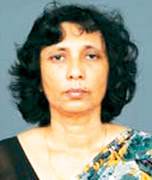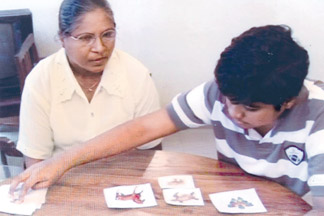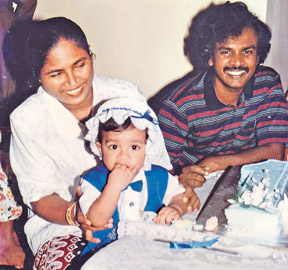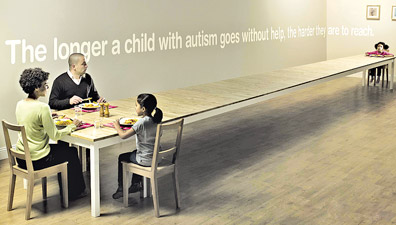National policy and awareness programs for autistic children vital
By Kurulu Kariyakarawana
|

Prof. Hemamali Perera
|
Mr. and Mrs. Premathilaka Perera had their only child, a baby boy
born on November 18, 1995. Due to the lack of oxygen the baby was born
underweight at a kilogram and 300grams. He was given oxygen through out
the first day and then kept in an incubator for a week before being
discharged from hospital. Although it was like this at the beginning the
infant was growing up to be normal child until his first birthday.
Trying to grasp a word or two from his parent's vocabulary, Malintha was
an active child from his early days. It was only when he was one- and-a-
half years that the parents realised their son was only using single
words to communicate. Words such as Amma and Thaththa. Their suspicions
turned into fear when Malintha quitted speaking all together as soon as
he turned two.
As parents are won't to do, Malintha's parents took him to the
doctors, then to a specialised doctor and to many other medical experts
to only learn that their son was suffering from autism by birth and that
there will is no permanent cure for it. They didn't know what to do next
as he was growing up like a normal child but with no speech ability and
had his own eccentric ways of behaviour compared to other children of
the same age. The nurseries refused to accept him saying that he would
not stay still but was constantly on the move, running here and there.
They took him to child psychiatric specialists to understand the
condition of his disorder but the only thing the doctors did was record
accounts of the behaviour of their son instead of giving a single piece
of advise in the right direction.
The doctors who hadn't a clue about the early training of an autism
child told the parents to train Malintha in the way that they thought
best. Mr. and Mrs. Perera with great difficulty trained their son to
feed himself, toilette practice and many other basic practices a normal
child would do by the age of six. He had a problem in walking at the
beginning. He always walked on his toes and this had to be stopped
immediately otherwise it would be a lifetime habit. His parents took him
to the sea beach and trained him to walk properly. Malintha's mother
house- trained him with basic education with reading and writing skills.
Their efforts were not in vain. Today Malintha an 18-year-old youth has
developed with many skills compared to other children suffering from
autism. He has special skills in drawing, writing in several other
languages and a special liking for basketball. Perera is a businessman
who devoted his life for his son's betterment is commited to setting up
a proper system for autistic children. The PAAC is currently working on
a special project to set up a full fledged Care Home and Developing
Centre for Autistic Children in Sri Lanka. A philanthropist in Kandy is
to sell a three and half acre land for the proposed site for a very low
price. The construction budget of the project of a two storied building
with all the relevant facilities for the early learning environment of
autistic children is estimated at Rs.381million. The PAAC which is
registered with the Ministry of Defence and Department of Social
Services as an organisation that would help individuals affected by
autism disorders and help their families to cope with their behaviour.

An aged parent with her son who is autistic |
 |
| Mr. and Mrs.
Premathilaka Perera with their son on his first birthday |
Giving birth to a physically and psychologically sound child is the
dream of an every parent. Although a child is a gifted blessing the
agony which parents go through when they have a a physically impaired
offspring is beyond words. The world is developed to face common issues
like hearing and visual impairment of babies at birth and also to treat
certain psychological conditions. Yet there are certain psychological
disorders that newborns inherit from parents or due to other medical
complexities which is be common nowadays. One such common disorder is
children suffering from autism at birth.
Autism is a disorder of neural development characterised by impaired
social interaction and verbal and non-verbal communication and by
restricted, repetitive or stereotype behaviour. This is a common
disorder that can be seen in Sri Lanka and in other parts of the world.
According to medical statistics the prevalence of the disorder in Sri
Lanka is 93 to 1. Considering the annual birth rate it is estimated that
around 3500 children are born every year with autism. And this situation
is less worse compared to countries like the USA which has a birth rate
of 80 to 1 autistic children a year.
The medical explanation for the disorder is that autism affects
information processing in the brain by altering how nerve cells and
their synapses connect and organise. How this occurs is not well
understood. This is one of the three disorders in the Autism Spectrum
and the other two being Asperger's Syndrome, which lacks delays in
cognitive development and language and Pervasive Developmental Disorder,
Not Otherwise Specified (PDD-NOS) which is diagnosed when the full set
of criteria for autism or Asperger syndrome are not met. The diagnostic
criteria require that symptoms become apparent before a child is three-
years- old.
Autism being a common disorder the measures taken by many developed
countries in the world to tackle this problem at present is considerably
very high. Although this disorder does not have a permanent cure ,
modern science has found that it could be controlled to a great extent.
To develop an autistic child to the standard of a regular interactively
sound person with the age needs a lot of effort. Except for a certain
condition of non-verbal autistic children (who would rarely speak) the
rest can be developed to a better status with the help of modern medical
practices and principles being adopted by many developed countries.
However, this scenario is entirely different in Sri Lanka where at least
a national discussion on the specific topic is barely formulated by the
competent authorities.
It is sad to learn that except for a single state- run model school
and few privately run institutions to groom such children for a very
high price, that could afforded only by a handful of privileged parents,
not a proper system has been functioning or implemented to date. This
was brought into the notice of President Mahinda Rajapaksa in 2011 by
then Secretary of Ministry of Provincial Council and Local Government
Dr. Nihal Jayathilaka, (who is the current Secretary to the Ministry of
Health). Dr. Jayathilaka proposed a fully fledged development programme
for the children suffering from autism at national level and a national
committee to be set up covering a range of experts representing Ministry
of Health, Ministry of Social Services, Ministry of Education, Ministry
of Women's affairs and Child Development, Ministry of Finance, Ministry
of Provincial Council and Local Government, Ministry of Vocational
Training as well as representatives from World Health Organisation,
UNCEF, Sarvodaya Movement, Carlton Pre Schools, Parent's Association of
Autistic Children and National Council for the Disable.
Also a group of experts in the medical field were nominated for the
committee including Prof. Hemamali Perera (Child Psychology Specialist),
Specialised Doctor Neil Thalagala (Family Health Bureau), Specialised
Doctor Samanmalie Subasena (Paediatric Specialist), Victoria Liyanage
(Education Specialist), Specialised Doctor Anoma Jayathilaka (WHO) and
Dr. Anil Dasanayake (Director Health Ministry).
|

Autistic children abroad are trained to cope with day-to-day
issues |
Following these proposals President Mahinda Rajapaksa directed the
relevant authorities to set up a Ministerial Sub Committee and
instructed the Ministries of Health, Social Services, Women's Affairs
and Child Development and Education to create a national policy on this.
However the progress of this is program is not satisfactory enough and a
national policy on autism is yet to be adopted.
Explaining the present situation the President of the Parent's
Association of Autistic Children (PAAC) Premathilaka Perera said the
need for a national policy on children suffering from autism is greatly
felt though no solid action has been taken by the authorities. PAAC is a
body that has a membership of parents of over 3000 autistic children in
Sri Lanka in various age groups. Having first hand experience on autism
because of his only son suffering from the disorder from birth Perera
stressed the importance of establishing a national policy on autism.
According to him autistic children have never been given special
consideration by the relevant authorities or official in the health
sector but considered as part of the children suffering from Down
Syndrome, which is totally differt. No proper education or training
policies are implemented or practised for autistic children and hardly
does an autistic child absorbed into the education system in the
country. Because of the intricate symptoms of autism and lack of
training and experience pre-school teachers are hesitant to admit
children suffering from autism to nurseries or pre-schools. This is the
moment an autistic child will be rejected from society for the first
time and confined to a solitary life thereafter.
We spoke to Prof. Hemamali Perera Psychiatry Professor of the Colombo
Medical Faculty believes that much can be done to develop a national
policy and system to embrace the neglected autistic children in Sri
Lanka. Compared to the programs being adopted by the developed countries
worldwide what Sri Lanka has in place for the autistic children and
adults suffering from autism is not satisfactory at all.
Prof. Perera said that due concern is not given to these special
children although attempts had been made by various aggrieved parties to
propose a national policy on this from time to time.
There are very limited number of services set up for these children
and sadly no national centre for autism in Sri Lanka. However the
Ministry of Health has launched a pilot project namely National Program
for Children with Special Development Needs which is already off the
ground. Although this project is looking at the special needs in
general, a significant part is reserved for autism related issues as
well.
Expressing her displeasure over the attitude of managements of
pre-schools and primary schools ,Prof Perera said that all teachers are
obliged to receive an autistic child in the classroom with no
discrimination.
The education services should take urgent steps towards quality
classroom and learning environments. One of the main issues is that the
teachers are not trained for a special situations like this. Most of the
autistic children can be taught in the mainstream. Except for a few
extreme cases they could be trained and educated in regular schools but
with special attention from the teachers. An important aspect that has
to be implemented is to train teachers to cope with an autistic child in
the classroom and the need for awareness programs are essential, she
said. |

